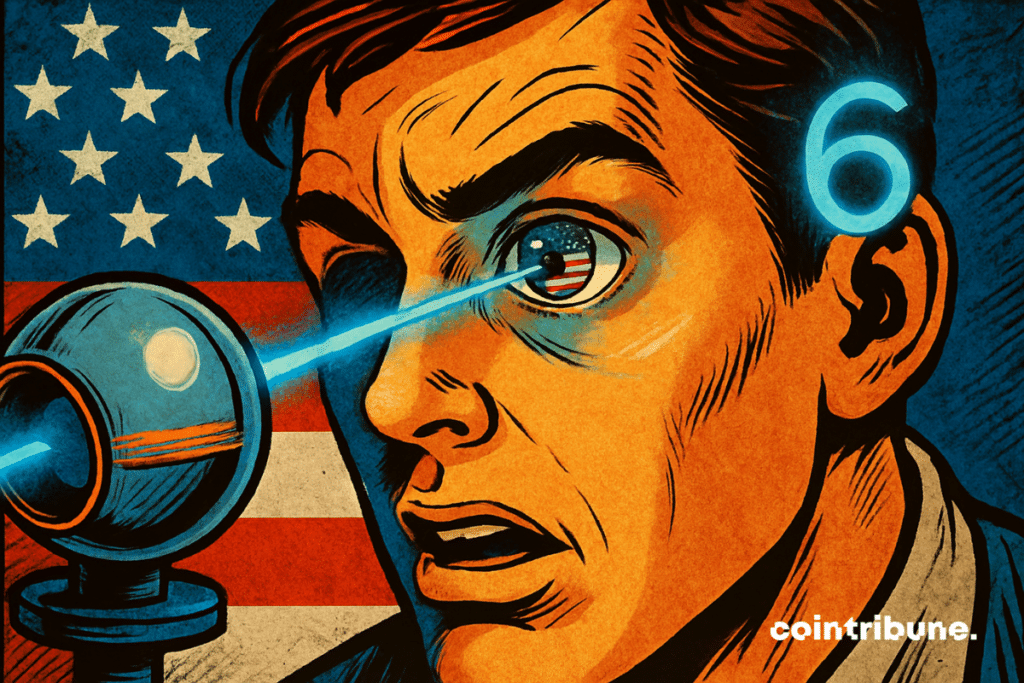Fri 02 May 2025 ▪
4
min read ▪ by
Worldcoin arrives in the United States. Objective: to scan your irises to prove that you are human. Behind this project, Sam Altman, the head of OpenAI, is betting on biometric technology to create a unique and secure digital identity. With six sites opened in key cities, the challenge is set: link blockchain, crypto, and eye recognition to reinvent access to digital services.


In brief
- Worldcoin arrives in the United States with six sites.
- The initiative, led by Sam Altman, is accompanied by partnerships with Visa and Tinder, integrating World ID into payments and age verification.
- But the technology divides opinion, between the promise of a more human web and concerns regarding privacy and the use of biometric data
Identification by the naked eye
The founder of OpenAI, Sam Altman, keeps blurring the lines between science fiction and reality.
This time, it’s not about generating images or texts with AI, but about closely examining… your eyes. The crypto project Worldcoin – recently renamed simply “World” – is now rolling out six centers in the United States to collect iris scans using its famous Orb, a spherical biometric device that looks more like an extraterrestrial artifact than a verification booth.
Austin, Atlanta, Los Angeles, Nashville, Miami, and San Francisco have been chosen as the first stops of this techno-identity adventure. Objective: to create a unique IrisCode, specific to each user, to verify that they are indeed a human being and not a robot.
In return, the user receives a free dose of WLD, the native crypto. It all comes with a promise: that of a Web where humans are not relegated behind bots, but regain centrality.
This technology, though controversial, responds to a contemporary urgency: the proliferation of artificial intelligences, deepfakes, and forged identities. For Altman and his partner Alex Blania, the time has come to establish proof of humanity in a world increasingly saturated by fakes.
Crypto, data, and society: an orbit under tension
But behind the technical feat, Worldcoin’s ambition is also economic. Two major partnerships have just been announced. First with Visa, which will soon offer a “World Visa Card” exclusively for World ID holders.
Then with Match Group, parent company of Tinder, which will test age verification via eye scan in Japan. In short: your irises will not only serve to prove that you are human, but also to flirt, pay, and maybe tomorrow… vote?
However, this crypto project is not unanimous. Some governments, like Hong Kong, have already requested the halt of data collection by World. Because yes, although the founders assure that the data are decentralized and impossible to reconstruct, distrust persists. Especially since the promise of absolute anonymity has never really withstood great economic ambitions.
Altman claims to want to keep humans at the center in a world where AI occupies more and more space. Admirable? Maybe. But for that, is it really necessary to scan the eyes of the entire world? The question remains open, and the answer will probably depend on the degree of citizens’ adherence. Or their weariness in the face of the bots’ invasion.
In summary, World has not only launched a technology: it has lit a fuse. That of a new debate on identity, privacy, and the place of humans in the BTC ecosystem. The project could well reshape our relationship to technology by imposing a global biometric standard… or crash headlong into the wall of distrust. One thing is certain: all eyes are on it. Meanwhile, Mastercard is also trying to reshuffle the cards by announcing strategic partnerships to revolutionize crypto payments.
Maximize your Cointribune experience with our “Read to Earn” program! For every article you read, earn points and access exclusive rewards. Sign up now and start earning benefits.


Fascinated by Bitcoin since 2017, Evariste has continuously researched the subject. While his initial interest was in trading, he now actively seeks to understand all advances centered on cryptocurrencies. As an editor, he strives to consistently deliver high-quality work that reflects the state of the sector as a whole.
DISCLAIMER
The views, thoughts, and opinions expressed in this article belong solely to the author, and should not be taken as investment advice. Do your own research before taking any investment decisions.

